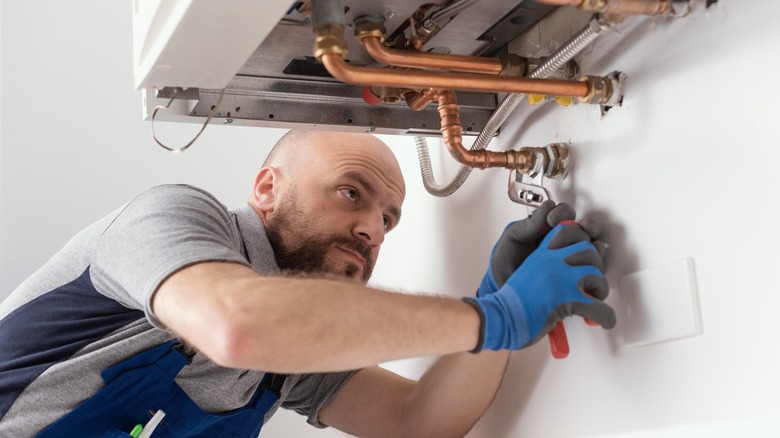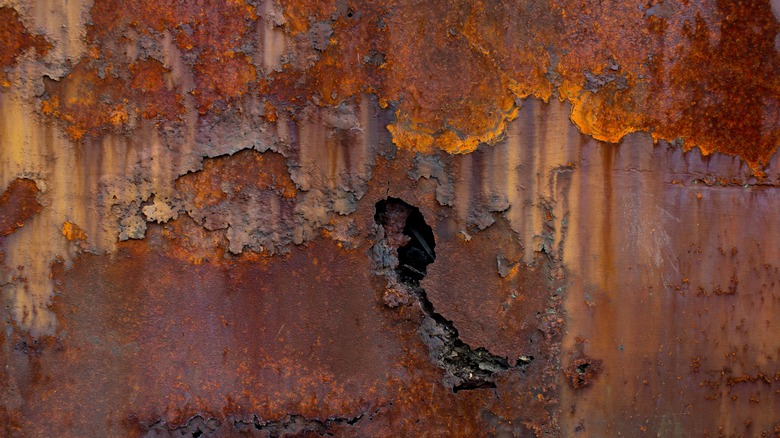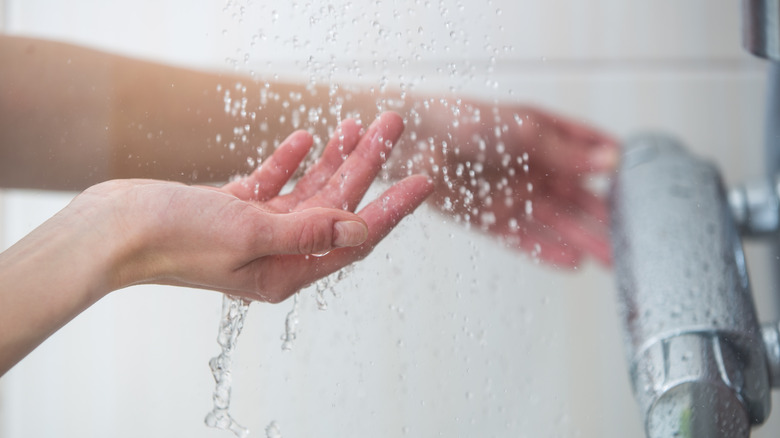Signs You Need To Replace Your Water Heater, According To An Expert
Your water heater provides an essential resource for your home — as comfortable living relies on an immediate and constant supply of hot water. It's crucial for cleaning dishes and clothes, showering, and the basic functions of life. The U.S. Department of Energy suggests a water heater that stores about 50 to 60 gallons for households of one to three persons and a larger storage tank of 80 gallons for homes with up to four.
Still, your water heater won't last forever. Eventually, it will begin to deteriorate, reducing its ability to provide enough hot water for the home. If your current water heater has been in use for several years, you might want to start researching replacement options in order to stay ahead of the inevitable replacement. In an exclusive interview with House Digest, Jake Romano, the manager of John the Plumber, discusses some of the telltale signs that your water heater is on the way out, and that a new one will be needed sooner rather than later.
Your water tank is leaking or rusting
Problems on the exterior of your water tank can be a strong indicator of a failing appliance. Romano explains, "if your hot water tank is leaking, you almost certainly need a new water heater. of course, this isn't the case if a connection, pipe, or valve is leaking. But if the tank itself has a hole somewhere, you're probably going to need to purchase a replacement." If you notice any drips coming from the heater itself, or on the floor in the area where it is installed, you should definitely have the appliance inspected.
Another way to identify a problem is by checking the quality of your water. Romano goes on to warn that "water heaters are, unfortunately, susceptible to corrosion. Even if you don't mind rusty water, you should call a professional as soon as possible because rust leads to holes and leaks. Rusty water doesn't always mean that your water heater is rusting, but it's a sign." Water tanks typically take a long time to develop these types of problems, but the older your appliance is, the more likely it is that the issues are serious.
You have no hot water
Even if there are no visible signs that your heater has a problem, you may begin to notice some issues with its functionality. Romano explains, "traditional hot water tanks usually last around 10 years. While there are many reasons your water heater may have stopped producing hot water, and many of them are repairable, no hot water is often an indicator that a replacement might be coming." Since the water heater's primary function is to create hot water in abundance, it is important to monitor the system and take note of any sudden changes in your supply.
However, it's not always a worst-case scenario adds Romano, "many water heater issues that result in no hot water can be repaired — so this isn't a guarantee that you need a replacement. And, oftentimes no hot water is simply because the circuit breaker needs a reset." Therefore, a sudden lack of hot water shouldn't immediately warrant a trip to the nearest appliance store, be sure to check out alternative explanations first, before jumping to the worst outcome possible.
You don't have enough hot water
In a similar circumstance to a total loss of hot water, you may be seeing a drastic reduction in the amount available. Romano says, "a traditional hot water tank works by heating and storing hot water. As you use the stored hot water, cold water enters the tank and heats up. This cycle repeats on and on. But if you're noticing that you don't have enough hot water, it means one of two things: something is wrong or your hot water needs have increased."
Looking at your water usage habits can help solve any mystery that may rear its head in regard to missing hot water. "If your family has gotten bigger or you purchased an appliance that uses more hot water, your tank may not be sufficiently sized," he continues. "You may need to upgrade to a larger hot water tank, tankless water heater system, or consider a water heater booster. (Water heater boosters are uncommon. I don't personally have experience with them, but they seem to be a great solution.)"
You hear banging, clunking, or other unusual noises
Many problems that occur over the lifetime of a water heater can present themselves elsewhere in the home. The sudden presence of strange noises in the home should be taken seriously. Romano notes "if you hear something banging around the inside of your water heater, you probably have sediment building up inside. As clean as our water may be, there are always dissolved solids and particles in our water. These particles often settle in the hot water tank and accumulate."
Sediment is a common issue within plumbing systems, especially in areas with particularly hard water. "As sediment builds up inside your water heater, the particles may clump up and start banging around. If there's enough buildup, then sediment has probably already begun impacting your water heaters' efficiency. At that point, your water heater is using more energy and working harder to produce less hot water. It's the beginning of the end for your tank," warns Romano. Therefore, regular servicing of your water heater is recommended to ensure that you are continuing to get the best out of your equipment. Identifying a problem early can help you avoid increased utility bills and a sudden, emergency replacement down the line.
Your water heater is old
Finally, considering the age of your unit can help determine whether the time has come to replace it. Romano notes that "water heaters don't last forever. Typically, you can expect around seven to 15 years from a traditional hot water tank, and perhaps over 25 years from a tankless water heater." As with any other appliance that you use on a regular basis, standard wear and tear will eventually take its toll, reducing the effectiveness and energy efficiency of the equipment.
As your heater continues to perform its duties, it will, unfortunately, become more susceptible to breakdowns and a reduction in efficiency. This means that increased water usage combined with an aging piece of equipment can magnify any potential issues to an even greater extent. Romano concludes with a word of warning — "if your water heater is getting up there in age, you may want to replace it sooner than later. Personally, I'd rather proactively replace a hot water tank than wait for it to leak all over my house."





